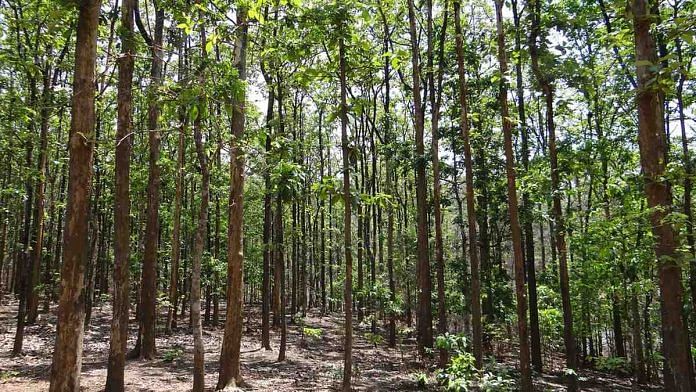New Delhi: As many as eight state governments have told the Supreme Court that its own officers have not followed due procedure while rejecting claims of lakhs of tribals over forest land — thereby putting them at the risk of eviction.
According to The Scheduled Tribes and Other Traditional Forest Dwellers (Recognition of Forest Rights) Act, 2006, the claim of a forest dweller means his/her right to live, conduct farming and collect forest produce from a particular area.
The claim has to be first made before the forest rights committee of the gram sabha, then the sub-divisional level committee and then the district-level committee for final approval.
The affidavits have been filed by the governments of Rajasthan, Tripura, Karnataka, Chhattisgarh, Goa, West Bengal, Assam and Maharashtra.
The Act says the reasons for rejecting the claims need to be communicated in writing to the claimant, following which the claimant can appeal against it in the sub-divisional level committee within 60 days.
However, a review of all the affidavits, accessed by ThePrint, revealed that the reasons for rejecting the claims were not informed to the claimants.
The affidavits of the state governments stated that most of the claims of forest dwellers are awaiting a final decision, and, in most cases, proper reasons for rejection were not given — often not taking into account the evidence submitted to claim the ownership.
On 13 February, the Supreme Court had ordered the eviction of 1.89 million forest dwellers whose claims were rejected. However, the court later stayed the verdict and asked the state governments to explain why the claims were rejected and whether all the evidence was examined before rejecting them.
Following the court order, 17 states filed their affidavits before the SC, out of which these eight states have categorically stated that they wrongly rejected the claims.
Also read: Forest Rights Act is quite clear on genuine forest dwellers, but states are letting it down
Rajasthan rejected 39% claims
The Congress-led Rajasthan government in its affidavit has stated that over 39 per cent of the claims are awaiting a final decision. The affidavit, however, showed a goof-up — the government cited approval orders by sub-divisional magistrate office, Vallabhnagar, Udaipur, as rejection orders.
In Tripura, the government affidavit revealed that some claims awaited a final decision and were never formally rejected. It also noted that the claimants were not informed of their right to appeal before the sub-divisional level committee. The government has sought six months’ time to complete re-examination of the claims.
Karnataka rejected over 62% claims, Goa 68%
Karnataka directly blamed its officials for rejecting the claims without applying their mind. In its affidavit, the government stated that over 62 per cent of the claims got rejected, and the sub-divisional committees junked most of them “without making detailed inquiry”.
The government also stated that over a lakh claims were rejected and that no reason was given for declining over 12,000 claims. The state government has asked for 18 months’ time to have a re-look at all the rejected and pending claims.
The situation remains the same in Chhattisgarh where the process followed for rejection of the claims was “not in accordance with forest rights rules” and, hence, there were a large number of “inappropriate rejections”.
In Goa, almost 68 per cent of the claims are awaiting a final decision. The government said that no opportunity was given to the forest dwellers to produce evidence, which could prove their right over a particular area.
Similarly, brazen rejections were carried out in West Bengal where out of the 1,42,000 claims, over 95,000 were rejected without any proper reason. In Assam too, claims were rejected without any reason.
The Maharashtra government, meanwhile, stated in its affidavit that the district-level committee in most of the cases did not take into account “admissible” evidence by claimants.
Such admissions of several state governments hold significance in the light of the central government’s initial argument that “due diligence” was carried out while rejecting claims of forest dwellers.
The Supreme Court will now hear the matter in November, when arguments on the constitutionality of the Act will also be raised.
Also read: Most of the 20 lakh forest dwellers facing eviction don’t know why they’re being ousted




Harish Salve is considered to be the No.1 lawyer of India.. But that doesn’t mean that he is a good economist., Even after the 2G scam. hundreds of MNC’s Invested crores and crores in many projects and the investment still it goes on..
Likewise animal activists without any actual knowledge and ground reality of the particular area approach court for banning and putting restrictions on hunting the vermin wild animals which are very much against the interest of the poor farmers whose crops after heavy investments give him nothing.In our country wild animals are conserved but not managed, that is not being asked by courts.